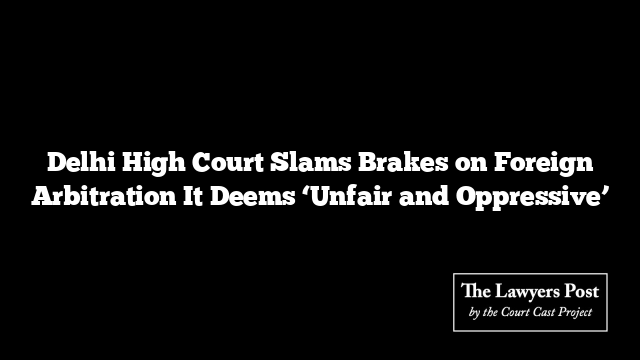In a ruling that sends a strong signal on the limits of arbitration’s reach, the Delhi High Court has declared that Indian civil courts are empowered — and at times obliged — to halt foreign-seated arbitrations when they appear to cross the line into the territory of harassment or injustice.
The case at hand revolved around a high-stakes contractual fallout between Engineering Projects (India) Limited (EPIL), a government-run PSU, and MSA Global LLC, an Oman-based security and military systems integrator. Their relationship soured after disagreements emerged during a border security infrastructure project at the Oman-Yemen border. MSA took the dispute to arbitration under ICC rules in Singapore.
But what followed wasn’t just a routine arbitration process — EPIL alleged it was a stacked deck.
The controversy zeroed in on Andre Yeap, MSA’s co-arbitrator, whose prior associations with MSA’s top executive were never disclosed. According to EPIL, this omission compromised the neutrality of the tribunal and breached the transparency standards under Article 11 of the ICC Rules. Even after challenging Yeap’s role before the ICC and the Singapore High Court, EPIL found no relief.
Turning to home turf, the PSU sought protection from the Delhi High Court, which delivered a sharply reasoned judgment. Justice Purushaindra Kumar Kaurav affirmed that civil courts are more than passive observers in such cases — they’re “sentinels on the qui vive,” guardians against procedural abuse.
“When arbitration becomes a tool for coercion instead of resolution, courts must intervene,” the judge remarked, stressing that Indian courts are duty-bound to preserve justice and not allow arbitration to serve as a “vehicle of abuse.”
Invoking the civil courts’ authority under Sections 9 and 151 of the Civil Procedure Code, the Court held that the Indian judiciary retains jurisdiction in extraordinary cases where arbitration violates public policy, appears oppressive, or deprives a party of fair adjudication.
The Court found that EPIL had established a prima facie case, faced irreparable harm, and tipped the balance of convenience in its favor — the classic legal trifecta needed for interim relief.
As a result, the arbitral tribunal’s proceedings were put on hold, and both parties were restrained from participating further until the matter is fully resolved in the Delhi court.
On the legal battlefield, heavyweight counsel clashed: EPIL was represented by Senior Advocate Sandeep Sethi and his team, while MSA Global was backed by Senior Advocate Rajiv Nayar and associates.
This decision stands as a potent reminder that even in the age of global arbitration, the Indian civil court is no mere rubber stamp — especially when justice is on the line.





